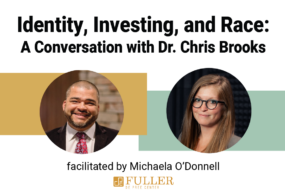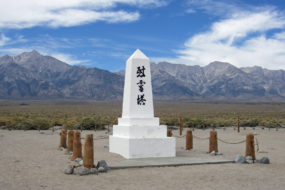February 7, 2021 • Life for Leaders
Scripture: Matthew 25:16-18 (NRSV)
The one who had received the five talents went off at once and traded with them, and made five more talents. In the same way, the one who had the two talents made two more talents. But the one who had received the one talent went off and dug a hole in the ground and hid his master’s money.
Focus
Every choice we make to spend money is a way of investing in systems and goods and communities. And so we can ask ourselves: are we investing in ways that exploit people? Or are we investing in ways that align with God’s redemptive work in the world?
Devotion
For the most part, I’ve always thought about this parable in Matthew as pretty straight forward. It’s a story about making wise financial investments even in the face of risk. Based on that interpretation it can serve a kind of creed for a variety of types of investments—be it our time, money, or like I wrote about yesterday, our relational investments. Don’t be paralyzed by fear in the face of risk, seek a solid return wherever possible, and enjoy the fruit of good stewardship!
But, when I was doing a bit of research on this parable in preparation for these devotions, I found an interesting theory by some scholars that made me question my assumed interpretation. These scholars argue that perhaps it’s not the first two servants who are worth modeling our behavior after, but instead the third—ya know, the guy who buries the money in the ground. They say that based on likely money practices of the time, it’s quite possible that servants one and two engaged in exploitive business practices in order to double their money. Their theory is that the two servants were engaged in shady lending practices—the kind that prey on the vulnerable, put them in debt, and charge so much interest that it’s hard to ever get out of it. If this were to be true, the third servant who refuses to participate in such a practice—and goes on to speak truth to power later on in the text—is the exemplar.
Now, I’m not the New Testament scholar at De Pree (paging Mark Roberts!), so I’m not going to say “this is the way it is!” In fact, most of the time I find those kind of black and white answers less helpful, anyway. So, for today, let’s just consider what it would mean if these scholars were right. What would it mean if this was a passage that was more about not participating in exploitation than it was about the fact that God loves wise investing?
Regardless of who’s the exemplar, this possibility challenges us to think about not only the risk and return involved in investing but also the methods by which profit is made. Profit is good, but not if it comes at the exploitation of others. That’s about the furthest thing from being entrusted to someone’s care. In some ways, it feels hard to know if the money we earn costs others too much along the way. If you’re like me, your investments are managed by a company who specializes in that and whose goal is to ensure you see good returns. And, I’ll admit, I don’t always keep a close eye on things.
But, our investments go beyond the stock market. Think about all the discretionary spending you do: where you shop for clothes, what restaurants you eat at, or what news you pay for. Every choice we make to spend money is a way of investing in systems and goods and communities. And so we can ask ourselves: are we investing in ways that exploit people? Or are we investing in ways that align with God’s redemptive work in the world?
Reflect
If you have investments in the stock market, do some digging. Work to understand if what you’re supporting comes at the cost of others, or if it aligns with Kingdom values.
Act
For more on Biblically Responsible Investing, check out our Making it Work episode with Rachel McDonough.
Pray
God, we want to invest in things that matter to you. We want to invest in ways that are wise and don’t exploit people. Grow our understanding and help us to recognize when we might need to look at things a different way. Amen.
 Sign up to receive a Life for Leaders devotional each day in your inbox. It’s free to subscribe and you can unsubscribe at any time.
Sign up to receive a Life for Leaders devotional each day in your inbox. It’s free to subscribe and you can unsubscribe at any time.
Find all Life for Leaders devotions here. Explore what the Bible has to say about work at the unique website of our partners, the Theology of Work Project. Resources on today’s Life for Leaders theme can be found here: Resources for Christian Investors

Dr. Michaela O’Donnell is the executive director of the Max De Pree Center for Leadership where she oversees the center’s vision, strategy, program, and team, all with the goal of helping leaders like you respond faithfully to God in all seasons of your life and leadership.
Michaela is the author of Make Work Matter: Your Guide to Meaningful Work in a Changing World. It’s gotten rave reviews from folks such as Dave Evans, Mark Labberton, Missy Wallace, Luke Bobo, Dee Ann Tuner, Kara Powell, and more. This book is a reflection of Michaela’s heart as both an entrepreneur and a practical theologian. Drawn to the real life working out of big issues, it is a how to for anyone walking the road of calling in a changing world.
Click here to view Michaela’s profile.





Wow. Talk about making stuff up! It seems pretty clear cut in the parable. “They say that based on likely money practices of the time, it’s quite possible that servants one and two engaged in exploitive business practices in order to double their money.” Scholars came up with this? You can base that on a biased education. That can happen NOW. Capitalism works every time it’s tried. I like where you went with it. We do need to make sure we support the business practices that align with our values, but burying the money is a good option?
It’s taken out of context. According to verses that followed, God was pleased with the first two, which means they were not involved in exploiting and God was displeased with the last one who did not invest. The writer twisted the Word of God.
This is not biblical! According to the verses that followed, God was pleased with the first two (which means, they were not involved in exploiting) and God was displeased with the last one who did not invest. Don’t twist the Word of God. Don’t take it out of context.
Good morning
I want to start by saying I enjoy reading the daily devotional. Thank you all for these.
I am perplexed by today’s devotional. This parable of the talents by Jesus is not at all about taking advantage of anyone or even money (for the most part)
I really hope you read verses 14-30 and do not misinterpret the Bible and confuse people.
This parable, like the other two in this chapter focuses on what Christians should be doing between now and the second coming.
We are all given different abilities and we are called to use our gifts, resources and talents to our best ability. We should be using these talents to let the world know about Jesus and His second coming.
I think of this scripture as referring to our gifts. They should be used to benefit all we come in contact with. Can’t think writer was concerned with financial matters. many people just get by. They don’t have money to invest and even shopping they have to stretch their resources to get the most benefit from what they have to fulfil their needs
Michaela, thanks for your two devotionals drawn from Matthew 25:16-18, specifically applied to investing in people and investing in systems. I recently learned about Matthew 13:44 and the parable of the treasure discovered in the field that hiding something of value when hidden in the ground was a common, cultural practice of being safe with said treasure. Maybe, both “safe” burriers of the financially valuable item (both recounted by Matthew and same Greek root word) were “playing it safe.” Note how the two parables close out. In the first, the earlier burrier overcomes safety and takes a big risk (with inferred commendation by Jesus). In the second, the earlier burrier rationalizes his actions, fearfully impunes the character of the wealthy man and is publicly chastised by the wealthy man for his “safe” actions. Michaela, I’ll let you take it from here. In my walk and ministry with the Lord, I have learned two things here. First, we are called to security in the Lord not to be safe. Second, the Lord honors faithful even child-like risk-taking over “playing it safe.” FYI, my sobriquet is “Risk” (Rick) Peterson, being a son of Peter (pros and cons). Blessings in your walk, family and multi-faceted ministry, “humble” Rick Peterson